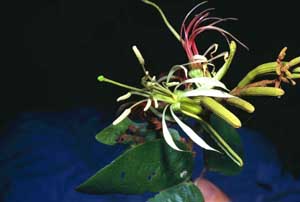|
|
 20 more ripple DHJanzen100682.jpg high resolution
|
|
| But the loss of horses leading to loss of Crescentia alata trees leading to local loss of Glossophaga bats is not the only ripple. Glossophaga bats are also pollinators of a number of other tropical dry forest trees, such as this Bauhinia ungulata flower. Each of these species has its time of year to flower, a time that it depends on the presence of flower bats. If they have left, or been diminished, by the absence of Crescentia trees, the Bauhinia takes a pollinator hit. This may then mean that Bauhinia becomes less abundant, with the consquences that the species that were dependent on it become less abundant (and other species become more abundant). The arrival of the horse in 1500, and its widespread demise in 2000, would both have had multiple and complex ripples through the ecological structures of their ecosystems (and even other ecosystems that recieved things such as migratory bats). | ||
back to lecture slides
or skip to: